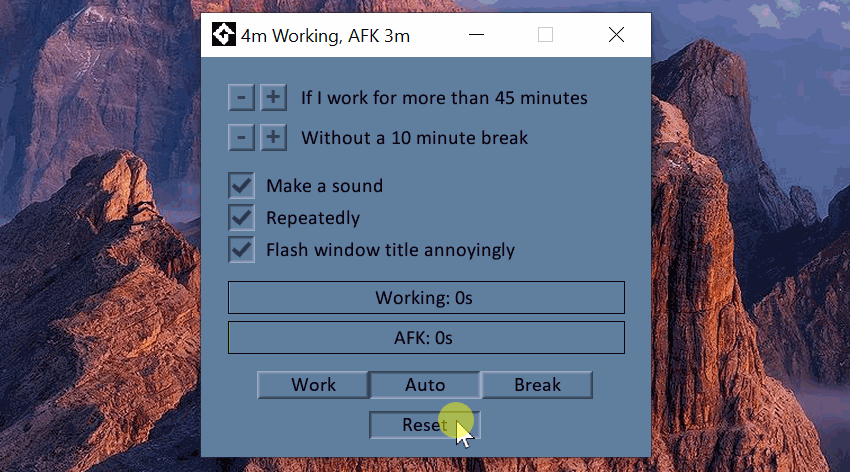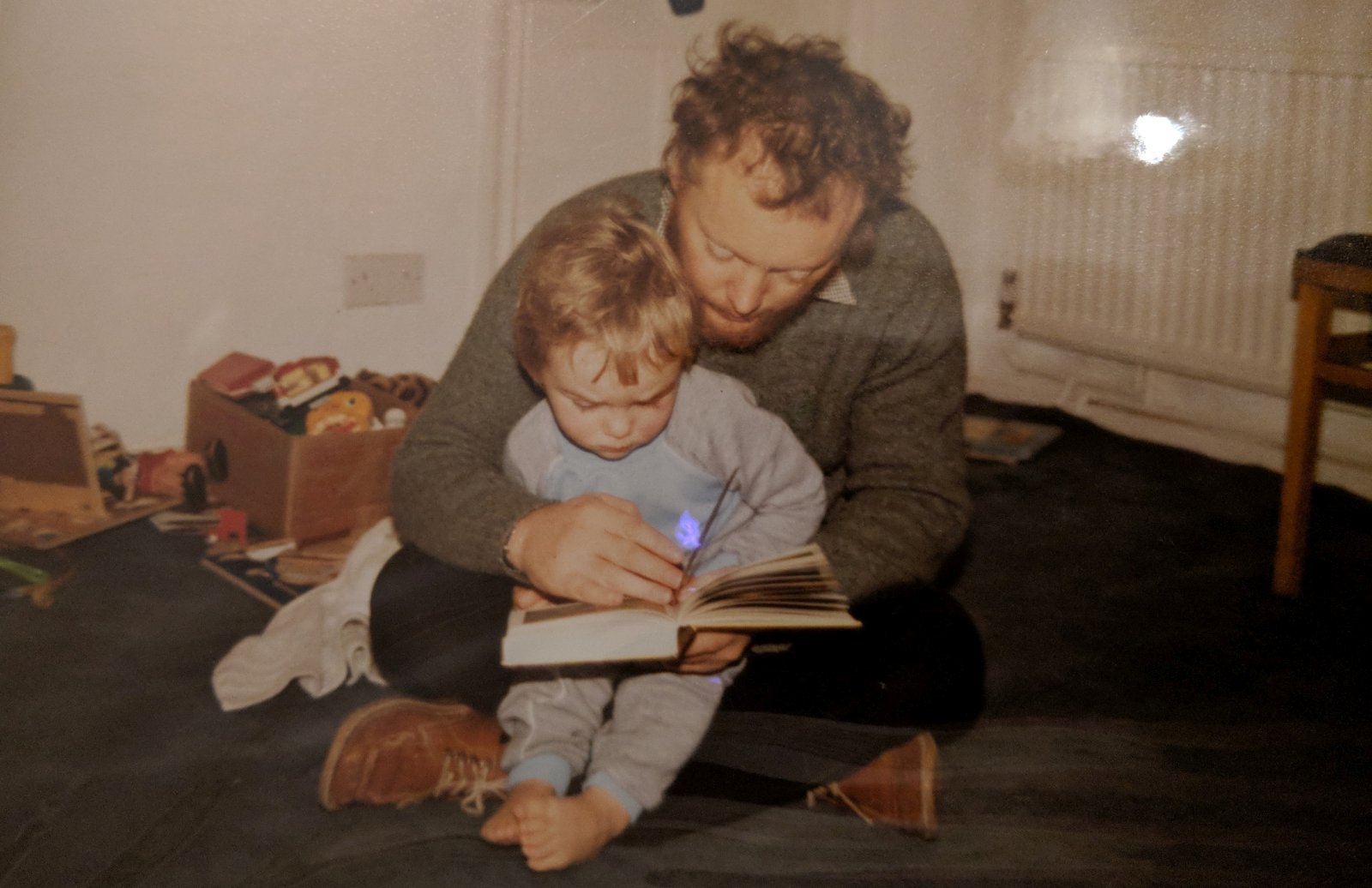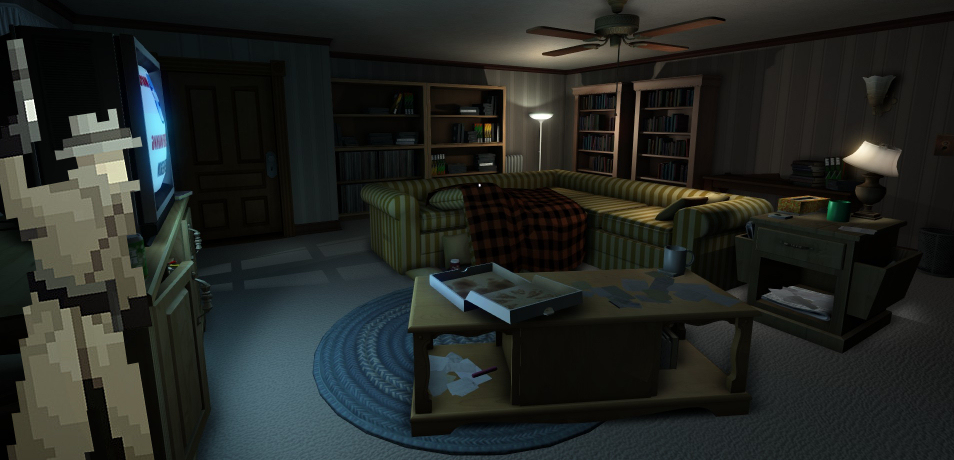TOM FRANCIS
REGRETS THIS ALREADY
Hello! I'm Tom. I'm a game designer, writer, and programmer on Gunpoint, Heat Signature, and Tactical Breach Wizards. Here's some more info on all the games I've worked on, here are the videos I make on YouTube, and here are two short stories I wrote for the Machine of Death collections.
Theme
By me. Uses Adaptive Images by Matt Wilcox.
Search
Tom’s Tstretch Timer
I could never find a work/break timer that worked quite how I wanted, so I made my own. Lately, though, I’ve had RSI issues, and now my focus is on just ensuring I don’t work too long without taking a break to stretch. My old timer half-worked for that, but to get really consistent, I needed something that:
- Tracked whether I was using my PC or not automatically, without needing to remember to press a button.
- Let me configure the maximum time I’m allowed to work, and how long I have to take a break before it counts as a break.
- When I overwork, nag me in (customisable) ways that are gentle enough I won’t just close the app, but persistent enough I won’t just ignore it.
- Met or exceeded the high standards of alliteration established by Tom’s Timer.
And so!
Tom’s Tstretch Timer
(Windows, 17MB, v1.6)

“Every moment of my life it haunts me. I work. I eat. I rest. I sleep. Still it persists. Tom’s Tstretch Timer 1.4.”
Victoria Tran, referring to a previous version.
“Repeatedly” means once a minute, and it stops nagging if you’ve been AFK 30 secs already. You don’t have to click Reset to resume working, that’s just for the GIF. You can force Work or Break mode with those buttons, but generally just leaving it in Auto mode is best.
Tom’s Timer 5
8 years ago I made a little timer app to sit in my taskbar and track how long I’d worked or not-worked. I’ve used it pretty regularly ever since, and every now and then my need for some extra feature or tweak outweighs my laziness and I make a new version. I’ve just made v5. Continued
Charity
When Gunpoint did well, in 2013, I thought: “I should give some money to charity. But this might have to last me the rest of my life. So I should wait til I have a second game out, and see how that does.”
When Heat Signature did well in, 2017, I thought: “It’s doing great so far! But how fast will it trail off? This has to cover the budget of the next game. What if Steam’s algorithm changes and all our revenue stops? Maybe after the third game I’ll know more about-”
I see what my brain is doing. There’ll always be enough uncertainty in my life that I can delay a donation in the name of caution. But I don’t think that loop ends on iteration 3 or 4, so I’m cutting it short now. I’m giving $25,000 to the Against Malaria Foundation and another $25,000 to GiveDirectly. Continued

My Week
This year I’ve started tracking the hours I spend programming, because generally once I start tracking something I naturally start to optimise it. I’m not a workaholic – I’m at greater risk of not putting in the hours than of putting in too many, and I’d like to make sure I’m putting in enough.
Programming is about 40% of my job. Another 40% is design, and the other 20% is every other job on a game that isn’t art or music. The design part is hard to track though: I find most productive design thinking comes from a big engine in the back while you’re doing other things, as it randomly matches disparate ideas and sprinkles them with what you’re currently experiencing and asks: “Is that anything?”
Programming, though, I can measure: I start a timer and then focus on work for anywhere from 8 minutes to 80. If I get the urge to check Twitter, I can but I have to stop the timer to do it, and only log the work time. I only get to log the time if it really was focused work – all breaks and interruptions and meals and everything else is excluded. Back when I notionally worked an 8 hour-a-day job, I had an hour for lunch, lots of Twitter breaks and interruptions. I’d be surprised if I averaged as many as 6 productive hours a day.
Anyway, here’s my first full week’s programming time tracked: Continued

Dad And The Egg Controller
After dad died, trying to be useful, we looked through his office. ‘Office’ is underselling it – there was so much equipment that it could equally qualify as a workshop or even a lab. It had the special kind of ordely chaos of a place filled with a thousand incredibly specific things, meticulously organised by type, when you don’t know any of the types.
I opened a tiny drawer. Ah yes, this is where he kept things that were brass, cylindrical, and slightly ridged. I closed the drawer, my task complete.
On his desk, though, I saw something I did recognise. Something I knew it would be my responsibility to adopt, decipher, and operate. I don’t know if he ever gave it a name, so I will now: it’s the Egg Controller. Continued
The Potato ‘Paradox’
I just learned about ‘The Potato Paradox‘, which refers to this surprising maths result:
Q: You have 100kg of potatoes, which are 99 percent water by weight. You let them dehydrate until they’re 98 percent water by weight. How much do they weigh now?
A: 50kg
It’s not a riddle or a trick, it’s literally true and the terms mean what they seem to mean. The Wikipedia page has some good explanations and diagrams of why the answer is right, which persuaded me that it was, but that didn’t solve the problem for me. To me the problem is: why am I so wrong about this? Continued
I Made A Taskbar Timer To Keep An Eye On Wasted Time
I definitely waste more of my time than I’d like. Mostly on Twitter, but also just with this mysterious business of general internetting. I’ll sometimes catch myself switching between 7 open browser tabs, each containing something I want or need to do, and doing none of it. And none of the productivity plug-ins or apps I’ve found do quite what I want, because my requirements are incredibly specific.
Update: Tom’s Timer 5 is now available, with cumulative tracking and stretch reminders! Continued
Pedestrian-Cyclist Tensions Reach A Flashpoint On The Canal Path
Today I cycled along the canal, which is neither a cycle path nor a footpath but a Resentment Path: one where both types of traffic are permitted but each feels the other is rather overstepping its bounds. Pedestrians resent the bike’s speed, its hard metal frame, and act like making way for it is a much bigger imposition than yielding to a jogger of equal pace and width. Cyclists resent the habit of pedestrians to expand – like a gas – to fill whatever sized vessel they find themselves in. In this way two people can entirely block a four-person-wide path, and even when they grudgingly accept the need to compress to allow something to pass, will immediately re-expand thereafter, maximising the number of times this huffy dance is necessary. Continued
Back Up Your Stuff
My Twitter-friend Chelsea may have lost a truly heartbreaking amount of work when a powercut somehow wiped her hard drive. She and probably anyone following the awful saga have resolved to be more zealous about backing stuff up online, so I thought I’d do a post about what I use and what I think of it. Continued

Thoughts About Praise And Confidence At GDC And Rezzed
I’ve just got back from sixteen days of travelling: first to the Game Developers’ Conference in San Francisco, then to the indie game show Rezzed in London. I was showing Heat Signature to the press at GDC and to the public at Rezzed, but events like these are also huge meetups for a bunch of geographically separated friends – and people who are very likely to become that. So it’s been more pleasure than business, and the evenings have been as hectic as the days. Continued

Christmas Chocolate Workshop 2014
I made chocolates for my family again at Christmas. Here’s what I did! Continued

What I’m Working On And What I’ve Done
This is a list of games I’ve worked on or am working on and the things people usually ask me about them. Continued

Filming Super Game Jam
The last few days I’ve been doing a game jam with Liselore Goedhart, being filmed as a documentary series called Super Game Jam. It’s been loads of fun, surprisingly chilled, and we’re really happy with the game we made. We finished it yesterday and let people play it at the London Game Space last night – fantastic to see people laughing so much at something that didn’t exist two days before. Continued

What’s Your Fault?
We use the phrase ‘your fault’ in a way that’s different to the sum of its parts. A fault can be any kind of problem, defect, or undesirable property. ‘Your’ just means belonging to you. If you have very unsteady hands, that’s a problem of sorts, and it’s yours. But if I hand you a full mug of coffee and you spill a bit of it, if you apologised, I’d say “It’s not your fault!”
Your faults are not ‘your fault’ if you’re born with them, if they’re forced on you, if you didn’t know about them, or a whole variety of other conditions. Language forms organically and messily, and it only makes sense to talk about it in generalisations. But the most prevalent trend I can see in the types of faults that are not ‘your fault’ is this: they’re the ones you can’t reasonably change. Continued

Here I Am Being Interviewed By Steve Gaynor For Tone Control
Gone Home writer/designer Steve Gaynor interviewed me for his podcast on the Idle Thumbs network, Tone Control. In it, I guess we vaguely cover tone at some point probably, but also: Continued